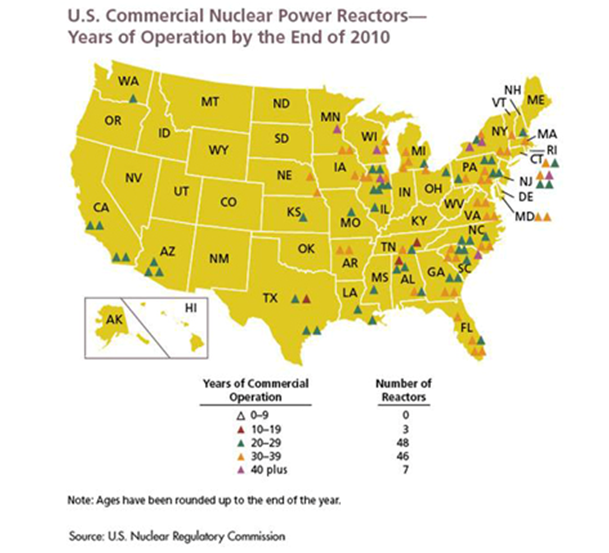I have blogged a lot about the decline of the U.S. nuclear industry. The Fukushima disaster, rising costs, aging reactors, cheap natural gas and other factors have been eroding support and investment for new reactors. Recently a report, Renaissance in Reverse: Competition Pushes Aging U.S. Nuclear Reactors to the Brink of Economic Abandonment, came out and offered some details about the future of the nuclear industry in the United States. A few years ago, there were one hundred and four nuclear power reactors in the United States. Four of those reactors have been designated for permanent closure. Some of the closures were related to technical issues but one happened because the operators could not make a profit and could not find a buyer. Another reactor was shut down because it had become too expensive to fix. In addition there have been cancellations of five projects to increase the output of five reactors because of rising costs.
The report utilizes eleven risk factors to project the future of individual reactors. including cost of electricity greater than the current wholesale market, commissioned before 1974, smaller than seven hundred megawatts, major systems broken, suffering multiple outages, single reactor at power plant, suffering long term outages, multiple safety issues and needing retrofit because of new standards triggered by Fukushima disaster. These risk factors were extracted from Wall Street analyses that were intended for investors who might be considering an investment in nuclear power.
When the hundred operating reactors are tested against these risk factors, over three dozen of the operating U.S. power reactors have four or more of the risk factors. The purpose of this report is to indicate which of the existing reactors are most likely going to be retired soon. A review of the report reveals that many of the problems that suggest retirement are not new but have been around since the beginning of nuclear power generation in the U.S. "The problems are endemic to the technology and the sector." In addition, the rising cost of keep the aging U.S reactor fleet working and the presence of low cost alternative energy sources including cheap natural gas and renewables will likely continue for the next several decades.
When I criticize nuclear power, proponents offer a number of defenses, some of them sound and some questionable. I always patiently explain that nuclear power is an extremely complex subject with economic issues, health issues, political issues, social issues, environmental issues, technical issues and other considerations. While it might be defendable on some specific challenges, when many factors are taken into account, it becomes obvious that nuclear power is just not a viable choice for the future of U.S. energy generation. The analysis in the report goes a long way toward validating my contention. As the Wall Street Journal analysis found, investing in the replacement of old U.S. power reactors with new nuclear reactors is just not a good bet.
